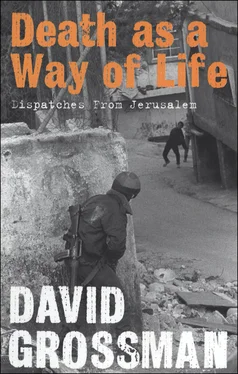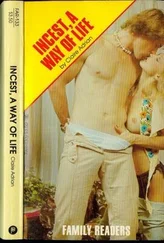David Grossman - Death as a Way of Life
Здесь есть возможность читать онлайн «David Grossman - Death as a Way of Life» весь текст электронной книги совершенно бесплатно (целиком полную версию без сокращений). В некоторых случаях можно слушать аудио, скачать через торрент в формате fb2 и присутствует краткое содержание. Год выпуска: 2013, Издательство: Bloomsbury Publishing, Жанр: Прочая документальная литература, на английском языке. Описание произведения, (предисловие) а так же отзывы посетителей доступны на портале библиотеки ЛибКат.
- Название:Death as a Way of Life
- Автор:
- Издательство:Bloomsbury Publishing
- Жанр:
- Год:2013
- ISBN:нет данных
- Рейтинг книги:5 / 5. Голосов: 1
-
Избранное:Добавить в избранное
- Отзывы:
-
Ваша оценка:
- 100
- 1
- 2
- 3
- 4
- 5
Death as a Way of Life: краткое содержание, описание и аннотация
Предлагаем к чтению аннотацию, описание, краткое содержание или предисловие (зависит от того, что написал сам автор книги «Death as a Way of Life»). Если вы не нашли необходимую информацию о книге — напишите в комментариях, мы постараемся отыскать её.
Death as a Way of Life — читать онлайн бесплатно полную книгу (весь текст) целиком
Ниже представлен текст книги, разбитый по страницам. Система сохранения места последней прочитанной страницы, позволяет с удобством читать онлайн бесплатно книгу «Death as a Way of Life», без необходимости каждый раз заново искать на чём Вы остановились. Поставьте закладку, и сможете в любой момент перейти на страницу, на которой закончили чтение.
Интервал:
Закладка:
II
We do not know yet what actually happened in the negotiating rooms, who conceded and who refused to concede. We have the exceptional testimony of President Clinton himself, according to which Barak was more flexible and more daring. But the Palestinians will, of course, claim the opposite.
Despite the reservations the Israeli left has about Ehud Barak’s somewhat military vision of peace, and about his attitude toward the Palestinians during the negotiations, it should be stated unequivocally that no previous Israeli leader has been so determined and decisive in seeking to make peace, and so bold in the concessions he was offering to achieve it. But did Barak really go the whole possible distance? Did he really, as he claimed, “turn over every stone” in his efforts to compromise? On the other hand, had he dared turn over even one more “holy” stone — for example, by ceding the Palestinians sovereignty over a significant part of East Jerusalem — would he have been able to win the Israeli people’s approval of the agreement in the referendum he has promised? Is Israeli society ready for such a move?
Another question nagging all those who wanted this summit to succeed: Did Barak have a real partner at Camp David for his far-reaching moves? True, there is no symmetry between the concessions the two sides can make. Israel holds almost all the cards, while the Palestinians have more restricted options. Nevertheless, there is no escaping the sense that Arafat was the less bold, less creative, and more stubborn of the two leaders. Even one who has great sympathy for the long suffering and the impossible position of the Palestinians cannot avoid the impression that Arafat was at fault this time in his analysis of the situation, as he has been more than once in the past.
Had Arafat shown any flexibility at all on the question of Jerusalem, he might have succeeded in getting Barak to take even larger strides, in the end breaking through the psychological snare that now paralyzes the entire process. Had Arafat been freer of the pressures exerted by the extremists among his people, and of the pressure of other Arab leaders, perhaps he would have avoided the scenario that now casts its shadow over many in Israel — the likelihood that the extremists on the right will gain power and Benjamin Netanyahu return to the political arena. If such developments occur, it will be almost impossible to achieve peace in the future.
*
But perhaps what is required is superhuman courage of a kind that the two leaders are not yet ready for. This they must have in order to dare change anything fundamental in their attitudes toward Jerusalem.
I wonder whether anyone who is not part of the local drama, and who observes it only from outside, can really appreciate the force of the emotions, the yearnings, and the compulsions that the old city of Jerusalem rouses in those who live in or around it. It is an area of less than a square kilometer, but it is so charged with history, myth, memory, wars, and the profound essence of so many cultures and of the three major religions, that it has become a kind of black hole of incredibly dense mass that threatens to suck the whole region into it.
Despite this, Ehud Barak became the first Israeli leader to agree to put Jerusalem on the table. Barak did this, and Arafat was not prepared, or able, to make any move toward him. Barak withstood enormous pressure from his own people, yet he did not rule out flexibility or a re-examination of ossified historical positions. Arafat turned him away with a categorical refusal. In this, Arafat bears greater responsibility for the summit’s failure.
But the minute that the Jerusalem question was made a subject of negotiation, many Israelis dared come out of the closet and admit that Israel’s claim of the “sanctity of united Jerusalem” is but an empty slogan. Jerusalem has never been united. Two hostile nations live within it. They maintain largely separate social and government institutions. Suddenly, in the past week, many Israelis discovered the huge gap between the authentic, real core of historical and religious Jerusalem, about which our forefathers dreamed throughout thousands of years of exile, and real-life Jerusalem. The latter contains twenty-six Palestinian villages that Israeli governments annexed to the city for political reasons. They then began swearing in its name and endowing it with the sanctity of biblical Zion.
This past week I visited some of those villages, together with minister of justice Yossi Beilin. I sought to discover whether they create any sort of religious frisson in me. Does any sort of national, historic shiver run through me that would testify to my connection with these places? When my grandfather in Warsaw closed his eyes and directed his heart to Jerusalem, did his soul long for the Palestinian village of Wallageh? Was it for the Qalandia refugee camp that the twelfth-century Jewish poet Yehuda Halevy yearned from distant Spain: “The savor of your soil delights my mouth like honey”?
I felt nothing. I discovered what I had long known: the boundaries of Jewish-Israeli identity actually need much less Jerusalem than what the municipal boundaries contain. The question is only whether Israel will — as its right-wingers demand — put up its future as collateral in order to battle for such an illusory identification with this manipulative Jerusalem, or whether Israelis can now define for themselves what their true spiritual, security, and religious interests are — and strive for them alone.
Now, after the acute despair of last night, it is clearer than ever that the peace process must go on, because if it stops for even a moment, despair and extremists will take control. The process will continue on its agonizing, bumpy way, requiring all of us to ask the most difficult questions of ourselves, about our identity, our faith, and our courage or cowardice. I hope that this is not just my own dream: I believe that there will be flexibility on the question of Jerusalem, on both sides. When the moment comes — may we not need another round of bloodshed before it does — both sides will realize that not only Jerusalem is holy; the lives of the people who live there are no less holy.
Boy Killed in Gaza
October 2000
The tragic killing of a twelve-year-old Palestinian boy on September 31, 2000, was televised and broadcast live around the world. Muhammad al-Durrah, who died in his wounded father’s arms, became an instant international symbol of the Palestinian uprising. To this day, neither the Palestinian Authority nor the Israeli Army has accepted responsibility for the death of the child in the crossfire between them.
Everyone who lives in this disaster area — the Middle East — has seen many horrific sights. But these pictures, the pictures of Muhammad’s death, are among the most harrowing ever seen here. They signify that even if we eventually have peace in the end, it may arrive too late.
Because war and violence have blinded our eyes, and have turned some of us into killers, and many others of us into tacit collaborators with murderers.
Of course, there is still no way of knowing who shot him, Israelis or Palestinians. In the madness that rages here, anything is possible. But there can be no absolution for such an act — for the execution of a twelve-year-old boy. When I hear Israeli army officers explaining that the father shouldn’t have taken his son to a riot zone, I feel nauseous.
For more than one hundred years we, Israelis and Palestinians, have been giving birth to children in battlefields, bullets shrieking past us. Yet another generation and another generation are thrown into the fire immediately at birth. Our parents did this to us, and we are doing it to our children. Fathers cannot defend their sons, but it also seems that they do not have the strength to rise above this fate for their families, to change this verdict. As if all of us here, Palestinians and Israelis, are doomed to be either murderers or victims.
Читать дальшеИнтервал:
Закладка:
Похожие книги на «Death as a Way of Life»
Представляем Вашему вниманию похожие книги на «Death as a Way of Life» списком для выбора. Мы отобрали схожую по названию и смыслу литературу в надежде предоставить читателям больше вариантов отыскать новые, интересные, ещё непрочитанные произведения.
Обсуждение, отзывы о книге «Death as a Way of Life» и просто собственные мнения читателей. Оставьте ваши комментарии, напишите, что Вы думаете о произведении, его смысле или главных героях. Укажите что конкретно понравилось, а что нет, и почему Вы так считаете.












